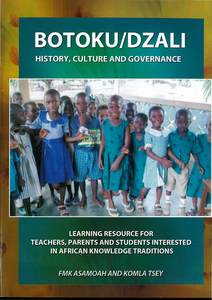Botoku/Dzali: history, culture and governance. A learning resource for teachers, parents and students interested in African knowledge traditions
Asamoah, F.M.K, and Tsey, Komla (2012) Botoku/Dzali: history, culture and governance. A learning resource for teachers, parents and students interested in African knowledge traditions. University Child and Youth Development Centre, Kwabenya, Accra, Ghana.
![[img]](https://researchonline.jcu.edu.au/21866/2.hassmallThumbnailVersion/21866__Asamoah_and_Tsey_2012_cover.jpg)
|
Image (JPEG) (Book Cover)
- Cover Image
Download (255kB) |
|
|
PDF (Front Pages)
- Supplemental Material
Download (819kB) |
||
|
PDF (Back Pages)
- Supplemental Material
Download (428kB) |
Abstract
[Extract] Before the second Avazoli celebration, hosted by Botoku, on the first to the third December 1989, the Botoku Traditional Council set up a History Committee comprising Lt. Col (rtd) F.M.K. Asamoah as the chairperson and Dr. Komla Tsey as the secretary. Other members of the History Committee were Osofo C.K. Akatu, Afeno Elizabeth Adams and Afeno Patience Adawrama.
The History Committee was tasked to write a history of Botoku Dzali from their migration as part of,the Avazoli family group from Notsie, in present day Republic of Togo, to present day Botoku in south-eastern Ghana.
It was realised that there were discrepancies in the oral history of Botoku Dzali as narrated by the various oral historians. A reliable written history of Botoku Dzali was therefore necessary for the present and future generations.
It was also realised that due to the influence of Christian religion, the traditions and culture of Botoku people were eroding fast. For instance, it was noted that the chieftaincy institution which was the core of the culture of Botoku for administration and unity of the traditional area, was in jeopardy as many of the stools were without occupants because the eligible people who were nominated to be chiefs refused the offer on the ground of their Christian religion.
There was yet another negative factor which was undermining the culture and the tradition of Botoku. It was noted that the majority of the children of Botoku citizens living outside have little knowledge of the culture and traditions of Botoku. Some of them could not even speak the Ewe language properly. This was due to the fact that they spent very little time at Botoku when they accompanied their parents to funerals or other events. They left immediately when the events were over. They spent most of their time outside Botoku, attending school and spending their holidays with their parents who were not residing at Botoku. They finally stayed away working. There was a feeling that a written history would serve as a useful resource for parents interested in educating their children about their ancestral roots.
| Item ID: | 21866 |
|---|---|
| Item Type: | Book (Non-Commercial) |
| ISBN: | 978-9988-1-6392-1 |
| Keywords: | community development, Ghana, history, African knowledge traditions, teachers, Botoku, Dzali |
| Date Deposited: | 04 Sep 2012 23:43 |
| FoR Codes: | 13 EDUCATION > 1303 Specialist Studies in Education > 130399 Specialist Studies in Education not elsewhere classified @ 100% |
| SEO Codes: | 93 EDUCATION AND TRAINING > 9305 Education and Training Systems > 930503 Resourcing of Education and Training Systems @ 100% |
| Downloads: |
Total: 1522 Last 12 Months: 22 |
| More Statistics |



